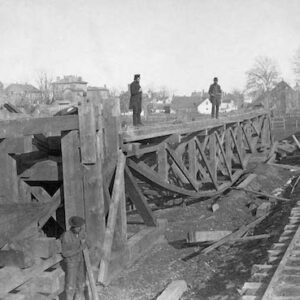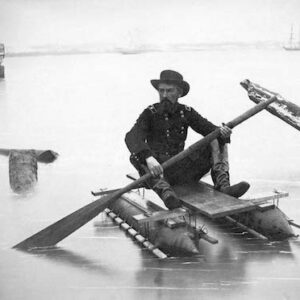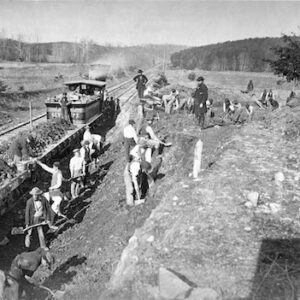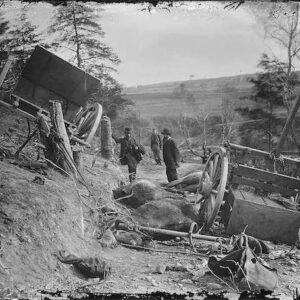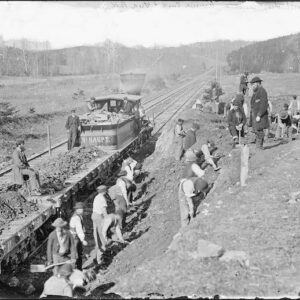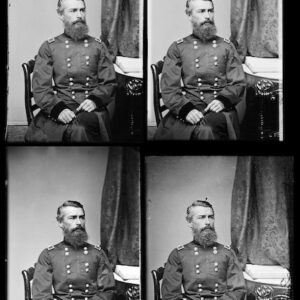Tag: Haupt (Herman)
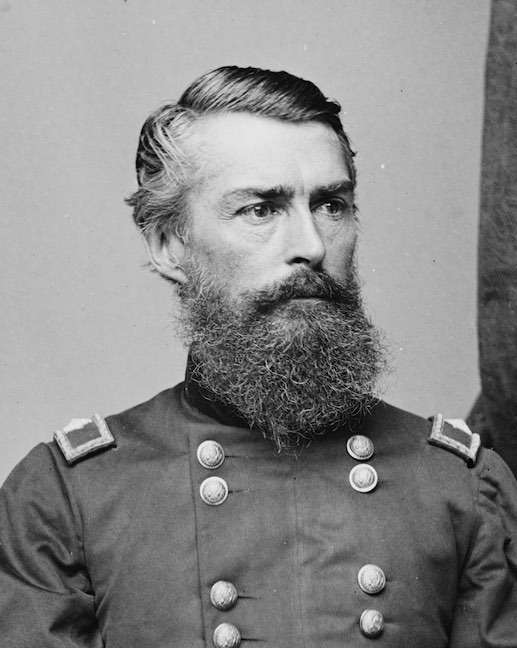 Wikipedia says: Herman Haupt (Philadelphia, March 26, 1817 – Jersey City, December 14, 1905) was an American civil engineer and railroad construction engineer and executive. A Union Army General, he played a key role in the American Civil War, during which he revolutionized U.S. military transportation, particularly the use of railroads.
Wikipedia says: Herman Haupt (Philadelphia, March 26, 1817 – Jersey City, December 14, 1905) was an American civil engineer and railroad construction engineer and executive. A Union Army General, he played a key role in the American Civil War, during which he revolutionized U.S. military transportation, particularly the use of railroads.
…In the spring of 1862, a year after the start of the Civil War, the U.S. War Department organized a new bureau responsible for constructing and operating military railroads in the United States. On April 27, Haupt was appointed chief of the bureau by Secretary of War Edwin M. Stanton, as a colonel and aide-de-camp to major general Irvin McDowell, then in command of the defenses of Washington, D.C. Haupt repaired and fortified war-damaged railroad lines in the vicinity of Washington, armed and trained railroad staff, and improved telegraph communications along the railroad lines. Among his most challenging assignments was restoring the strategic Richmond, Fredericksburg and Potomac Railroad line, including the Potomac Creek Bridge, after its partial destruction by Confederate forces. Despite an inexperienced workforce and other serious impediments, Haupt had the line back in use in under two weeks. President Abraham Lincoln was impressed with Haupt’s work there. In a visit on May 28, 1862, he observed: “That man Haupt has built a bridge four hundred feet long and one hundred feet high, across Potomac Creek, on which loaded trains are passing every hour, and upon my word, gentlemen, there is nothing in it but cornstalks and beanpoles.
Haupt was promoted to brigadier general of volunteers on September 5, 1862, but he officially refused the appointment, explaining that he would be happy to serve without official rank or pay, but he did not want to limit his freedom to work in private business (and he privately bridled at the protocols and discipline of Army service). He worked with Gen. Daniel McCallum, a fellow railroad man and later became good friends with John H. Devereux (the Superintendent of the United States Military Railroad at Alexandria, Virginia and later General Superintendent of the Cleveland & Pittsburgh Railroad). However, he chafed dealing with other Union army commanders. He also preferred civilian crews, including many of former slaves (“contraband negroes”) to soldiers. His Construction Corps had 300 men divided into 10 man squads by June 1862, and was later enlarged to include bridge-builders, then construction of freight cars, barracks, wharves, warehouses, etc. and extended to Tennessee and accompanied Sherman’s thrust through Georgia under the direction of Colonel William Wierman Wright and division engineer Eben C. Smeed. Haupt also experimented with bridge demolition using torpedoes (inserted in holes drilled in trusses) and also discussed in a November 1862 report various methods of destroying locomotives (firing a cannon ball through the boiler was irreparable; locomotives with fireboxes drained then fired could be repaired). He also tested a lightweight 2-clamp “rail-twister” invented by his subordinate Eben C. Smeed, for use in raids behind enemy lines.
Offered promotion again in early autumn 1863, Haupt hinged his acceptance on three conditions: that a central Bureau of U.S. Military Railroads be established to inspect, direct, and receive reports concerning construction and operation of all military railroads; difficulties with commanding generals be avoided through consultation and cooperation within their departments; the chief of the bureau should be free to move wherever his personal presence was necessary or to attend to whatever public or private business required his attention. The War Department declined to accept such terms. Haupt’s appointment was eventually rescinded on September 5, 1863, and he left the service on September 14. During that year as a general, however, he made an enormous impact on the Union war effort. The Civil War was one of the first wars in which large-scale railroad transportation was used to move and supply armies rapidly over long distances. Haupt assisted the Union Army of Virginia and Army of the Potomac in the Northern Virginia Campaign, the Maryland Campaign, and was particularly effective in supporting the Gettysburg Campaign, conducted in an area he knew well from his youth. His hastily organized trains kept the Union Army well supplied, and he organized the returning trains to carry thousands of Union wounded to hospitals. After the Battle of Gettysburg, Haupt boarded one of his trains and arrived at the White House on July 6, 1863, becoming the first to inform President Lincoln that General Robert E. Lee’s defeated Confederate army was not being pursued vigorously by Union Major General George G. Meade. During his service, Haupt developed and implemented “general principles of railroad supply operation” and “also detailed methods of construction and destruction of railroad equipment”. His two main principles were that the military should never interfere with the efficient running of the railroad and that rolling stock should be emptied and returned promptly to enable their re-use as transport.
